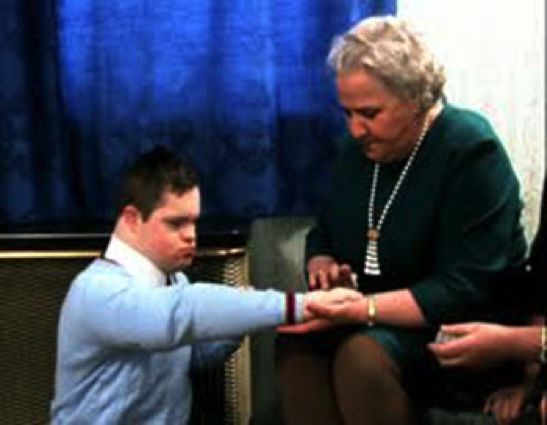Werner Herzog is the German filmmaker whose notion of “ecstatic truth” has brought him, among other places, to the Peruvian rainforest (“Aguirre, the Wrath of God”), death row (“Into the Abyss”), Antarctica (“Encounters at the End of the World”) and the Alaskan wilderness (“Grizzly Man”).
But to me his finest film is “Land of Silence and Darkness,” a 1971 documentary about a 56-year-old German woman named Fini Straubinger. Fini suffered a fall down the stairs when she was 9. Several years later she went blind. Then she went deaf. Then her mother confined her to bed for three decades.
Though we never quite learn how she recovered, Fini now devotes her life to helping others who are deaf-blind, folks who communicate by spelling out words on each other’s palms by a series of taps and strokes. Fini is magnificent with her regal bulk, heavy wool coat and deerstalker hat.
“Noble friend George,” she greets one of the guests at a birthday party. At an asylum she holds out her arms to a deaf-blind woman who could communicate only with her mother — and whose mother has recently died — and addresses her simply as, “Sister in destiny.”
Over and over, she takes people’s hands compassionately into her own and spells out on their palms: “I’m like you”… “I, too, can neither see nor hear”… “We are just alike…”
To the interviewer she observes:
“I always jump when touched.”
“Years go by in waiting.”
“If I were a painter I’d represent our condition like this; blindness like a black river flowing slowly like a melody towards great falls. On its banks, trees and flowers and birds singing sweetly. The other river, coming from the other side is as clear as the purest crystal. This one also flows slowly but also without any sound. Deep down there is a lake very dark and deep where the two rivers meet. Where they join, there are rocks making the waters foam afterwards to let them flow silently and slowly into that somber reservoir which lies in a deadly calm only troubled by an occasional ripple representing the struggle of the deaf-blind. I don’t know if you can understand this. The rocks who tear the waters stand for the depression the blind and the deaf feel.”
But the scene that comes back to me again and again is the one with Vladimir Kokol: 22 years old, born deaf-blind.
“It was never tried to awaken him,” Herzog observes in voice-over. “Only his father cared for him.”
“He never learned to walk.”
Vladimir is chubby, neatly dressed in a button-down shirt, blue V-neck sweater and pants with suspenders. He’s sitting on the floor staring into space, hitting himself on the head with a polka-dot ball, and blowing spit bubbles — Brrrrr, Brrrrrr, BRRRRRRR — the way you understand he has been for years.
Fini sits down beside him, takes his hand into her own, tries to make contact.
“I can’t hear anything. I’m just like you.”
No response.
“Poor dear.”
No response.
At some point, a pair of hands sets a portable radio, playing a bouncy 70’s jazzy tune, in Fini’s lap. And here a remarkable transformation occurs. Vladimir places his hand over the speaker, leans his forehead against its side, and grimaces in mingled ecstasy and pain as if trying to communicate with this “something living.”
Fini hands the radio over for Vladimir to hold. He sits quietly for a moment and then a beatific look lights his face. He smiles; he “understands.” And then he very slowly brings the radio to his breast, rests his cheek across the top, and with infinite tenderness, places his hands delicately, protectively, along the front.
He can’t hear. It’s not the music he connects to. He’s responding with such delicacy, such profound gentleness, to the vibration, the rhythm, the small pulse, perhaps, of heat. He might have been the Virgin Mary cradling the infant Christ.
I wondered what had happened to Vladimir Kokol who, if he lived, would have been in his early 60s by now. I Googled his name but the only references were to “Land of Silence and Darkness.”
Was his appearance in Herzog’s film his one “moment in the sun”? What treasured place did he have — do any of us have — in the universal plan? Did he fade back into obscurity? Did he ever hold a radio again?
In this season on the cusp of Advent, I like to think will one day Vladimir enter another realm: of light, of sound, of warmth.
I like to think that the Virgin Mother will one day be holding him.
Heather King is a blogger, speaker and the author of several books.

